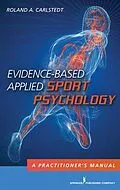This is the first book to call for a major paradigm shift in applied sport psychology by providing a wealth of systematic, scientifically validated research in a field where assessment and treatment has often been haphazard. In his quest to bring sport psychology to a higher level of validity, Dr. Carlstedt describes the most current assessment methods, intervention procedures, and promising research that are critical for use in evidence-based practice. These assessment and treatment methods are based on 25 years of rigorous scientific approaches and principles that incorporate the most sophisticated research methods now available.
The book describes the mechanisms that influence peak performance or psychological performance deficits and the mental training process, and provides procedures that will take the guesswork out of typical assessment and mental training. It offers tools with which practitioners can reexamine their modus operandi and critically explore the mechanism of interaction outcomes. To this end, the book includes extensive data sets on personality, behavioral tendencies, mind-body responses, and performance outcome.
Dr. Carlstedt advocates moving beyond compartmentalized therapeutic sessions in the office to directly observe athletic performance during training and actual competition. The text also contains individual and team case studies to enhance its focus on individualized, efficacy-tested protocols for each individual athlete.
Key Features:- Presents a detailed client-centered assessment and intervention model grounded in technology-supported, step-by-step procedures, followed by efficacy testing
- Focuses on the importance of empirical scrutiny and individualized, efficacy-tested protocols for each individual athlete
- Describes the Carlstedt Protocol containing a visualization efficiency test among many other technologically based assessment and training tools
- Provides a roadmap for achieving a gold-standard system of accountability
Practitioners will learn how to work within Carlstedt's integrative model to improve athlete performance and contribute to the advancement of evidence-based applied sport psychology.
Autorentext
Dr. Roland A. Carlstedt is a Licensed Clinical Psychologist, Board Certified Sport Psychologist and Chairman of the American Board of Sport Psychology. Roland is also a Research Fellow in Applied Neuroscience with the Brain Resource Company.
Inhalt
"
1. Introduction: Issues, Perspectives, and New Directions
Section I: Athlete Assessment: The Athlete's Profile of Key Mind-Body Measures
2. Assessment of Primary Higher Order Psychological Factors that Influence Performance
3. Psychophysiological and Behavior-Based Stress Testing
4. Brain Functioning: Neurocognitive Testing and Brain Mapping
Section II: On-The-Playing Field Athlete Assessment of Psychophysiological Processes
5. Monitoring and Assessment of Heart Rate Variability Before and After Competition
6. Monitoring and Assessment of Heat Rate Variability During Competition
7. Assessment of Brain Responses During Performance Using Wireless EEG
Section III: Assessment of Psychological Performance: Objective Performance of Outcome Measures
8. Critical Moment Analysis
9. Technical and Focus Threshold Analysis: Analyzing Mind-Body-Motor Control During Practice and Competition
Section IV: Athlete Intervention:
10. An Evidence-Based and Field Tested Athlete Assessment and Intervention Protocol
11. Psychophysiological Methods: Biofeedback and Neurofeedback
12. Cognitive and Imagery-based Methods
13. Technical and Focus Training: Using Motor Principles to Consolidate Technique and Enhance Motor Control
Section V: Efficacy Testing, Documentation, Analysis, and Practice Issues
14. Outcome and Efficacy Testing: Documenting and Analysis of the Effects of Mental Training
15. Psychological Performance Statistics: Documenting and Analyzing Psychological Performance
16. Databases of Athlete Mind-Body Processes: Longitudinal Documentation and Analysis of Mind-Body Performance
Section VI: Applied Integrative Sport Psychology in Practice
17. Putting it all Together: Intergrating Evidence-Based Approaches into Practice: Obtaining Advanced Training
18. Working with Coaches
19. Professional and Ethical Issues
"
